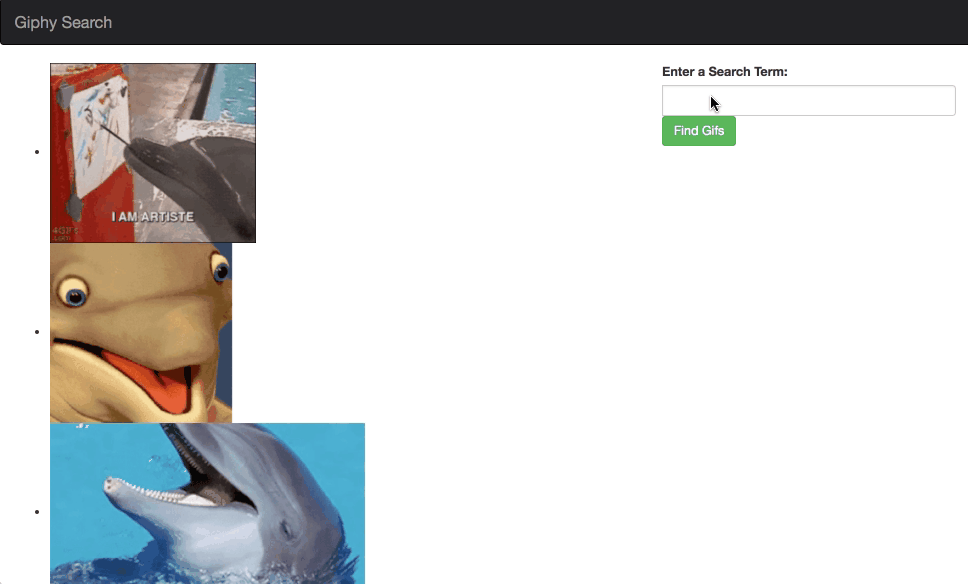- What is the component tree/hierarchy?
- Where does the state(s) live?
- File Structure
- What needs to be a function component vs. what needs to be a class component
- Functions are written differently between function and class components
- Class based components can handle state
- Class based components handle lifecycle methods
You're going to be building out a Gif search using the Giphy API. The URL for the API is
http://api.giphy.com/v1/gifs/search?q=YOUR QUERY HERE&api_key=API KEY&rating=g
On a successful fetch request, you should get back an array of objects, each containing information about a particular image.
"data": [
{
"type": "gif",
"id": "l0HlNQ03J5JxX6lva",
"slug": "bbc-wildlife-l0HlNQ03J5JxX6lva",
"url": "https://giphy.com/gifs/bbc-wildlife-l0HlNQ03J5JxX6lva",
"bitly_gif_url": "https://gph.is/2iC32M8",
"bitly_url": "https://gph.is/2iC32M8",
...
"images": {
"fixed_height_still": {
"url": "https://media0.giphy.com/media/l0HlNQ03J5JxX6lva/200_s.gif?cid=e1bb72ff5b9fa2866168584b51f13892",
"width": "400",
"height": "200",
"size": "55556"
},
...
"original": {
"url": "https://media0.giphy.com/media/l0HlNQ03J5JxX6lva/giphy.gif?cid=e1bb72ff5b9fa2866168584b51f13892",
"width": "480",
"height": "240",
}
...
}
}
]Note: Notice there are many URL keys on each image object. The first url
key, just below type, id, and slug will bring you to the images page on
giphy.com. We only want the path to the actual image, which found
at images.original.url. Using other url keys may cause CORS issues.
Your top level component will be the <App /> component-- no surprises there!
It will be responsible for rendering the <NavBar /> component (this component
is already provided for you, note the project has bootstrap loaded in) and the
<GifListContainer /> component
A container does data fetching and then renders its corresponding sub-component. That’s it.
- Container Components Learn React with chantastic
- Presentational vs Container Componets Dan Abramov
In our app the <GifListContainer /> will be responsible for fetching the data
from the giphy API, storing the first 3 gifs from the response in its component
state, and passing that data down to its child, the <GifList> component, as
a prop.
It will also render a <GifSearch /> component that renders the form.
<GifListContainer /> should pass down a submit handler function to <GifSearch />
as a prop.
<GifList /> is a presentational component. It receives data from its props
and renders html given the input data. It can render a top level <ul> with
each gif as an <li>.
The <GifSearch /> component will render a form that receives the user input
for the giphy search. The text input should be a controlled component that
stores the value of the input in its component state and renders the DOM
accordingly. The React component is always in charge of what the DOM looks like.
<GifSearch /> should receive a callback prop from its parent. On a submit
event, it should invoke that callback prop with the value of the text input. It
is this callback function, defined in <GifListContainer />, that will actually
query the API with the text the user has entered.
View React Async Gif Search Lab on Learn.co and start learning to code for free.
App
GifListContainer
/ | \
NavBar List SearchForm
|
Gifsss
